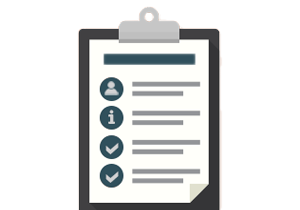How It Works
Get Educated
Spend some time with our website and learn the basics of workers compensation. Check out our guides on benefits and settlements.
» Learn About: Workers Comp Benefits
» Learn About: Workers Comp Settlements

Provide Your Information
Just fill out our form, and get connected to workers compensation lawyer near you. We just need your contact information and a few details about the incident.

Receive a Free Consultation
Once the form is submitted, you should receive a call from a local workers comp lawyer. You can prepare for the consultation by taking a look at the information below.

Questions to Ask a Workers Comp Lawyer in Tampa
- How long do I have to file my workers comp claim?
- What issues or difficulties do you foresee with my case?
- When will my workers comp case settle?
- What determines my work injury settlement amount?
- What if I need additional medical attention?
- When should I go back to work?
- What should I do if my employer asks me to work outside of my restrictions?
- What are your fees, and are litigation cost included?
What to Look for in a Workers Comp Lawyer from Tampa
Are they an experienced workers comp attorney?
Is their primary focus workers compensation?
Do they have good reviews on Google/Avvo?
FAQs About Workers Comp Lawyers in Tampa
If you get hurt at work, there is a standard procedure involved that your employer and insurance carrier must take to see to it that you receive medical treatment and, if you miss more than seven days of work-as a result of the injury, you receive compensation for whatever wages you lose while healing.
Those are the foundational pieces of workers compensation and If there Is a delay in receiving either benefit, particularly medical treatment, you have a problem and probably need an attorney.
"You don't want to report the injury and then wait around two, three weeks or more, and no treatment or doctor has been offered," Lee said. "If you wait that long, it becomes very difficult to get things back on track and get you all the benefits you're entitled to."
Lee said there are many signals that indicate you should at least consult with an attorney. Among the most obvious signs are:
Employer gives you the runaround when you bring up the injury.
Employer does not provide information on what doctor or clinic to go to for treatment.
Any hint you get that the employer has not reported the injury to their insurance carrier. If you do not receive a call or letter(s) from the insurance company, this Is a good Indicator they do not have the claim from the employer.
Your employer threatens to fire you if you report the injury.
Your employer or his insurance carrier says the injury didn't happen at work.
You have been out of work for more than two weeks because of the injury, but have not received any wage compensation.
The insurance carrier denies your claim.
"Workers often don't know what they don't know about workers compensation," Lee said. "When a worker is told by a doctor "Oh, workers comp doesn't provide that medical benefit,' the worker may not know that's not the case. That's why it always makes sense to consult with an attorney.
"Even if a worker doesn't need formal representation, it's still a good idea to find out what his or her rights are and what their rights are to challenge how they're being treated."
For whatever reason, there often is a temptation for workers to think they can handle a workers compensation case themselves. Just tell the judge what happened, show him your injury and the rest is obvious.
That's called proceeding with your case "Pro Se", meaning you've decided to represent yourself by filing a petition of benefits. Orders from the judges around the state are released and the outcomes are seldom favorable for cases tried "Pro Se."
"If you ask me when was the last time I saw a Pro Se case end with a favorable result for the worker, my answer would be I can't remember any," Lee said. "Almost all Pro Se cases get their claims denied."
The most obvious reason is that the injured worker doesn't know the rules and procedures involved in filing a workers compensation case.
Here are just a few things workers compensation lawyers know how to do to tilt the outcome in favor of the injured worker:
File the petition for the correct benefit and with sufficient specificity.
Develop sufficient admissible evidence to carry the burden of proof.
Conference with the physician.
Develop medical evidence to carry the burden or counter negative evidence/opinions.
Depose claims adjuster representing insurance company in an impactful way.
Handle all preparations and meet all deadlines if the case goes to a trial.
Call witnesses and cross-examine opposing witnesses.
Use experience with doctors, opposition attorneys, insurance carriers and judges to reach a favorable outcome for the client.
"The injured worker almost always bears the burden of proof in a workers compensation case," Lee said. "If you can't present that proof in the proper way, you're going to fail. That’s why you have an attorney. It significantly improves the chances of a successful outcome."
The topic of paying for an attorney is a tricky one in some cases, but not when it comes to workers compensation. The attorney works on a contingency basis, meaning he/she only gets paid if they secure benefits through the court or obtain a settlement.
And if you win benefits/a challenge through court, the insurance carrier pays your attorney's fees. If you lose, the attorney doesn't get paid.
What that means for an injured worker is that if the attorney takes your case, he/she is fairly confident they are going to win. Most Injured workers only ever pay an attorney's fee directly from their settlement, If and when their case settles.
The state of Florida has rules governing how much the attorney can charge, based on a percentage of benefits the worker receives. The maximum fees are:
20% of the first $5,000 of benefits
15% of the next $5,000 of benefits
10% of all benefits over $10,000
You may waive these statutory percentages and agree to a set contingent fee in the attorney’s fee agreement.
The judges in every case review the attorney’s fees to make sure the lawyer is compensated fairly and in accordance with the law. And remember, the insurance carrier pays the attorney’s fees.
“You should not let fees drive the decision when it comes to hiring an attorney,” Lee said. “My advice would be to reach out to someone early. The advice provided throughout the case can help the long-term result. If you are only going to pay a fee at the time of settlement, it largely will be the same fee you would pay if you hired someone early, as you would pay later”.
Why Choose a Workers Comp Lawyer Near You?
The typical client who walks into Mark Lee’s law office in Tampa seeking help for a workers compensation claim is probably going to like the experience.
Huh?
Yes, you read that correctly: the client is probably going to like the experience.
“The better insurance companies in our area, the ones that are well staffed, do a good job of authorizing benefits and keeping claims moving the way it should,” Lee said. “And our judges are very responsive. If we file motions or have any issues, they are acted on reasonably fast.”
Lee’s territory in the Bay Area runs from the beaches in St. Petersburg and Clearwater to the farms in Hernando and Citrus counties and back down to the bustling, growth-oriented metropolitan area that is Tampa.
He sees everything from construction workers to lifeguards; from retail employees to hotel workers; and from chicken farmers to valet attendants, who have been injured on the job and need help in the complicated workers compensation system.
“I don’t want it to sound like every case is a smooth operation because they’re not,” said Lee, who has been practicing along side Chris Smith in Tampa for six years. “But generally speaking, we can take our role as an advocate for our client to guide them through the process and avoid a lot of drawn-out litigation.
“There is always going to be adversarial component to it, but if both sides take a reasonable approach, you can actually get things done rather than be at each other’s throats. Protracted litigation is very difficult on injured workers, and can be very costly for the insurance companies.”
Lee sits on the board of the Florida Workers Advocates (FWA), an organization that is geared toward protecting the rights of workers in the state. He has experienced enough difficult cases and heard the tales of many others throughout the state, to know that plenty of things need improving, but workers comp in the Bay Area, is not as rotten as other places.
“We’ve got to find a way to give the injured worker some say in what doctor he or she sees,” Lee said, referring to the Florida law that says the employer or insurance carrier decides what doctor an injured worker sees. “Or we need to go back to the insurance carrier having to pay for the Independent Medical Exam. The lack of degree of choice ultimately causes of a lot of unnecessary litigation
“But in our area, the insurance companies and adjusters that get it right, really allow the system to operate the way it should.”
» More about: Workers Comp Benefits in Florida
Free Workers Comp Claim Evaluation
You deserve to be compensated fairly. Find out your rights and discover what your claim is worth.
How to Handle a Workers Comp Case on Your Own in Tampa, FL
Most claims do not require the help of a workers comp attorney. When the system works as intended, you simply have to notify your employer to kickstart the process of filing a workers compensation claim. If things do not work out in your favor, you have the option to appeal a claim denial. This will require the help of a workers comp lawyer, but for reference, the step-by-step guide is detailed below.
How to File a Workers Comp Claim in Tampa
When a worker gets injured on the job, the first, and maybe the most important thing he/she should do is find a supervisor or co-worker and report the injury. That is the starting point for successfully filing a workers compensation claim in Tampa. The employer and the insurance carrier are also key components for reporting the accident and claim. All three are vital in making the workers compensation system provide the benefits due.
Once the accident has been reported, the employee should seek medical treatment from the appropriate doctor, clinic or emergency room. It helps if he/she can take notes about the accident or write down names of witnesses, but getting proper treatment as quickly as possible should be the priority.
Florida law allows workers 30 days to file a claim and injured workers should know that sometimes comes into play. At first, a worker may experience only mild discomfort with something like a cut or muscle pull and not seek treatment right away. However, if the cut gets infected or the muscle pull is aggravated a few days or few weeks later, the employee suddenly realizes he/she needs treatment.
That’s why it’s so important to report an injury right away. Make sure there is a written record that an accident took place and it may require medical attention. That might be the deciding factor in getting a claim approved.
Employer’s Responsibility for Filing Claim
When an employer has been notified of a work-related injury or illness, they have an obligation to notify the insurance carrier. The law says they have seven days to file a report, but all sides agree that it’s best to do it right away.
The initial report should have details that include the employer’s identification information such as name, address, type of business. Information about the employee’s name, social security number, mailing address, phone number and occupation is necessary.
It helps to take note of important facts about the injury, such as the day, month and hour of the accident, where it happened, what type of injury was suffered, what caused it, statements from witnesses, and any other pertinent information.
Workers should be aware that an employer may decide not to report an injury. Often, it’s because the employer’s insurance premiums from going up. If that happens, the employee can report it directly to the insurance carrier.
If an employee has any concerns about the way the accident was handled, they can call the Employee Assistance Office for Tampa at 800-342-1741 or email wceao@myfloridacfo.com.
Insurance Carrier’s Responsibility with Claims Form
Now it’s time for the insurance carrier to step in and see to it that steps are taken to treat the injuries and get the employee back to work. The insurance carrier must file a form called “The First Report of Injury” (FRI) with Florida’s Division of Workers Compensation (FDWC). The form informs the state agency who was injured and how the accident happened. The employer and employee should receive copies of the FRI so they can verify the information reported.
The carrier has three days to provide the employee with information that explains the rights, benefits and procedures for obtaining benefits. The brochure should explain the obligations injured workers and their employers have under Florida law and the penalties they face if they are found in violation of those laws.
The employee is eligible for lost wages if he/she misses eight days of work because of the injury. If that happens, the carrier must notify the FDWC within 14 days.
The carrier should update the injured employee’s file with new medical reports and wage statements if the employee is due indemnity pay during recovery.
Deadlines for Tampa Workers Comp Claims
An injured employee legally has two years to file a claim for benefits, but the sooner the better.
Here are the important deadlines for workers compensation claims in Tampa:
Employee: Florida law allows employees up to 30 days from the day of the accident to file an injury report, but all parties involved consider it best to do so immediately after the accident happens.
Employer: The employer of an injured worker must file a report with the insurance carrier within seven days of being notified.
Insurance carrier: There are two important deadlines for insurance carriers to observe. The carrier has three days to send a brochure to the injured employee outlining their rights, benefits and procedures for obtaining benefits. The carrier has 14 days to report that an injured worker expects to receive lost wages compensation.
Occupational Diseases: If you are filing for death benefits due to occupational diseases, the death must have occurred within 350 weeks of the deceased’s last exposure to the source.
How to Appeal a Workers Comp Denial in Tampa
Appeals are time consuming and paperwork heavy. It helps to know the system. If you haven’t hired a lawyer, this would be a good time to go down that road. The insurance carrier has 120 days from the time the injury was reported to tell the worker that a claim has been denied. When your claim is denied, there is a system set up to resolve the dispute. Here’s a walkthrough of what you’re facing on appeal of a workers compensation claim in Florida.
Step 1: Contact the Employee Assistance Office in Tampa
If anything goes wrong with your workers comp claim, the first action you can take is to contact the Employee Assistance and Ombudsman (EAO) office. They are a part of the Florida Division of Workers Compensation with several offices around the state of Florida. Their function is to help avoid expensive litigation by investigating workers comp claim disputes and bring both parties to an agreement.
Email: wceao@myfloridacfo.com
Phone: (813) 221-6507
Address: 1313 North Tampa Street, Suite 503
Tampa, FL 33602
Step 2: The EAO Contacts the Insurance Carrier
The EAO takes your case and your arguments to receive benefits back to the insurance company to see if it can resolve the issues. There are common, and easily corrected mistakes with paperwork that can result in a denial. Sometimes the mistake is simply a miscommunication about what benefits are available and are easily resolved.
Step 3: The Insurance Carrier Issues a Denial
Unfortunately, things do not often get resolved when it’s just the state arguing on behalf of the employee. If the conflict is settled, the worker receives the disputed benefits and the case is closed. If not, (more often the case), the carrier has 14 days to deny lost wage benefits. If the dispute is over medical benefits, the carrier has 3-10 days to deny the benefit, depending on the cost. If they insist on denying the claim, the injured employee must decide if he/she wants to continue the appeal. If so, we move on to …
Step 4: Filing a Petition for Benefits
Now comes the critical stage in the process. The employee, or his/her lawyer if they have hired one, must file a Petition for Benefit with the Offices of Judges of Compensation Claims (OJCC). This is the start of what could be a long paperwork process. The Petition for Benefits has the usual identifying information (name, address, etc.), plus a detailed description of the injury, the employee’s responsibilities, the work assigned at the time of injury and a summary of the expected benefits. Details are vitally important so if you’ve been keeping a notebook on things, you are in good shape.
Step 5: Insurance Carrier Responds to the Petition for Benefits
The carrier has 14 days to respond to the Petition for Benefits. They can choose to pay the claim or continue to deny it. Most claims are denied, and the process moves on to the next step.
Step 6: Mediation & Settlement Negotiation
Judges order a mediation and either appoint a mediator or the two sides agree to hire a private mediator to speed things up. The Office of Judges of Compensation Claims has 40 days to set up a mediation. The mediator puts the two sides in separate rooms and goes back-and-forth with both sides to try and reach a settlement. If the two sides agree, the appeals process ends and that is what happens in most cases. If not, it’s on to a hearing.
Step 7: Workers Comp Hearing
Now it’s time for the judges to listen to arguments and things get really serious. The hearing must take place within 90 days after the failed mediation, but no more than 210 days after the original Petition for Benefits was filed. The two sides identify disputed issues at a pre-trial hearing and the judge sets a hearing date within the next 90 days. When the hearing begins, lawyers for both sides introduce evidence and call witnesses to support their claims. The Judge has 30 days to reach a decision.
Step 8: Option to Appeal
The judge issuing a ruling doesn’t mean the case is over. If the losing side wants to take one more crack at this, they can make a final appeal to the First District Court. This must be filed within 30 days of the OJCC Judge’s ruling, but this process often takes a year or more before the final appeal is granted or denied. The Court of Appeal receives the court records from the OJCC and both sides submit a written argument on the disputed issues. The Appeals Court can confirm the OJCC’s ruling; overturn that decision or turn it back to the OJCC for more findings.
About the author
Bill Fay has touched a lot of bases in his 45-year career. He started as a sports writer, gaining national attention for work on college and professional sports. He had regular roles as an analyst on radio and television and later became a speech writer for a government agency. His most recent work is as an internet content marketing specialist. Bill can be reached at bfay@workerscompensationexperts.org.
Sources:
- N.A. (2019, September) Workers’ Compensation System Guide. Retrieved from https://www.myfloridacfo.com/Division/WC/pdf/WC-System-Guide.pdf
- Barreiro, S. (2019, October 8) How to appeal Your Workers Compensation Denial in Florida. Retrieved from https://www.lawyers.com/legal-info/workers-compensation/the-workers-compensation-process/how-to-appeal-your-workers-compensation-denial-in-florida.html
- Burnson, P. (2019, May 10) top 30 U.S. Ports 2019: Trade tensions determine where cargo goes next. Retrieved from https://www.logisticsmgmt.com/article/top_30_u.s._ports_trade_tensions_determine_where_cargo_goes_next


